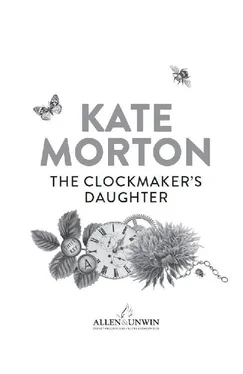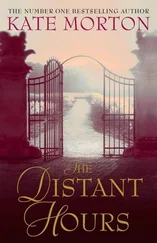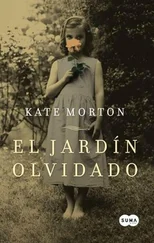Kate Morton - The Clockmaker's Daughter
Здесь есть возможность читать онлайн «Kate Morton - The Clockmaker's Daughter» весь текст электронной книги совершенно бесплатно (целиком полную версию без сокращений). В некоторых случаях можно слушать аудио, скачать через торрент в формате fb2 и присутствует краткое содержание. Год выпуска: 2018, Издательство: Allen & Unwin, Жанр: Старинная литература, на английском языке. Описание произведения, (предисловие) а так же отзывы посетителей доступны на портале библиотеки ЛибКат.
- Название:The Clockmaker's Daughter
- Автор:
- Издательство:Allen & Unwin
- Жанр:
- Год:2018
- ISBN:нет данных
- Рейтинг книги:4 / 5. Голосов: 1
-
Избранное:Добавить в избранное
- Отзывы:
-
Ваша оценка:
- 80
- 1
- 2
- 3
- 4
- 5
The Clockmaker's Daughter: краткое содержание, описание и аннотация
Предлагаем к чтению аннотацию, описание, краткое содержание или предисловие (зависит от того, что написал сам автор книги «The Clockmaker's Daughter»). Если вы не нашли необходимую информацию о книге — напишите в комментариях, мы постараемся отыскать её.
The Clockmaker's Daughter — читать онлайн бесплатно полную книгу (весь текст) целиком
Ниже представлен текст книги, разбитый по страницам. Система сохранения места последней прочитанной страницы, позволяет с удобством читать онлайн бесплатно книгу «The Clockmaker's Daughter», без необходимости каждый раз заново искать на чём Вы остановились. Поставьте закладку, и сможете в любой момент перейти на страницу, на которой закончили чтение.
Интервал:
Закладка:
Choosing the recording was one of only three tasks she’d been set. The second was visiting the reception venue owned by Penelope’s best friend, ‘just to introduce yourself, of course; leave the rest to me’. The third was liaising with Pippa, who’d offered to design her dress. So far, Elodie had completed none.
Tomorrow, she promised, pushing all thought of the wedding aside. Tomorrow.
She closed her eyes, the faint sounds of late-night customers buying battered cod and chips drifting up from downstairs, and without warning her thoughts returned to the other box, the one beneath her desk at work. The framed photograph of the young woman with the direct gaze. The sketch of the house.
Again that strange sensation, like the glimpse of a memory she couldn’t grasp, disquieted her. She saw the sketch in her mind’s eye and heard a voice that was her mother’s, but somehow also wasn’t: Down the winding lane and across the meadow broad, to the river they went with their secrets and their sword …
And when she finally fell asleep, at the very moment that consciousness slid away, the pen-drawn picture in her mind dissolved into sunlit trees and the silver-tipped Thames, and a warm wind brushed her cheeks in an unknown place she somehow knew like home.
II
It has been a quiet existence, here at Birchwood. Many summers have passed since ours, and I’ve become a creature of habit, following the same gentle rhythms from one day into the next. I haven’t a lot of choice. I rarely have visitors and those that do come these days don’t stay long. I am not a good host. This is not an easy place to live.
People, by and large, are fearful of old buildings, just as they fear the elderly themselves. The Thames Path has become a favourite rambling route, and sometimes in the evenings and early mornings people stop in the laneway and peer over the garden wall. I see them but I do not let them see me.
I rarely leave the house. I used to run across the meadow, my heart thumping in my chest, my cheeks warm, the movement of my limbs strong and bold, but such feats are beyond me now.
Those people in the laneway have heard rumours about me, and they point and dip their heads together in the way of gossips everywhere. ‘That’s where it happened,’ they say, ‘That’s where he lived,’ and ‘Do you think she did it?’
But they do not trespass when the gate is shut. They have heard this is a haunted place.
I confess to paying little attention when Clare and Adele spoke of spirits. I was busy, my thoughts elsewhere. Many a time since, I have regretted my distraction. Such knowledge would have come in useful over the years, especially when my ‘visitors’ have come to call.
I have a new one, just arrived. I felt it first, as I always do. An awareness, a slight but certain change in the stale currents that lick and settle in the treads of the stairs at night. I kept my distance and hoped that it would not bother me as I waited for the stillness to return.
Only the stillness did not return. Nor the silence. It – he , for I have glimpsed him now – is not noisy, not like some of them, but I have learned how to listen, what to listen for, and when the movements took on a regular rhythm, I knew that he intended to stay.
It has been a long time since I’ve had a visitor. They used to bother me with their whispering and thumping, the chilling sense that my things, my spaces, were no longer my own. I kept about my business, but I studied them, one after the other, just as Edward might have done, and with time I learned how best to move them on. They are simple creatures, after all, and I have become practised at helping them on their way.
Not all of them, mind you, for there are some to whom I have warmed. The Special Ones. The poor, sad soldier shouting in the night. The widow whose angry weeping fell between the floorboards. And, of course, the children – the lonely schoolgirl who wanted to go home, the solemn little lad who sought to mend his mother’s heart. I like the children. They are always more perceptive. They have not yet learned how not to see.
I am still deciding about this new one, whether or not the two of us can live peaceably together, and for how long. He, for his part, has not yet noticed me. He is much intent on his own activity. The same each day, traipsing a path across the malt house kitchen, always with that brown canvas bag slung over one shoulder.
They are all like that at first. Unobservant, caught in their own loop, absorbed by whatever it is that they believe they must get done. I am patient, though. I have little else to do besides watch and wait.
I can see him now through the window, making his way towards the little churchyard on the edge of the village. He stops and seems to read the headstones as if he is searching for someone.
I wonder for whom. There are so many buried there.
I have always been curious. My father used to say that I was born wondering. Mrs Mack said that it was only a matter of time before I ended up as flat as the curious cat.
There. He is gone now, over the top of the rise so that I can no longer tell which way he walks, or what it is that he carries inside his bag, or what he intends to do here.
I think I might be excited. As I said, it has been a while, and wondering about a new visitor is always buoying. It takes my thoughts away from the bones of habit upon which they usually pick.
Bones like these …
When they all packed up and fled, as the carriages tore like demons from hell along the coach way, did Edward glance behind him and glimpse in the dusk-lit window a sight to replace his nightmare?
Repaired to London and back behind his easel, did he blink sometimes to clear my image from his sight? Did he dream of me during the long nights, as my thoughts have dwelt on him?
Did he remember then, as I do now, candlelight flickering on the mulberry wall?
There are others, too. Bones that I have forbidden myself to polish further. There is little use wondering when there is no one left to ask.
They have all gone. They are all long gone. And the questions remain mine. Knots that can never be untied. Turned over and over again, forgotten by all but me. For I forget nothing, no matter how I try.
CHAPTER THREE
Summer, 2017
The odd, unsettled feeling was still with Elodie the following day and she spent the train ride into work jotting down everything she could remember of her mother’s bedtime tale. As London blurred on the other side of the window, and a group of schoolboys further down the carriage sniggered at a phone screen, she rested a notepad on her knee and let the real world disappear. Her pen raced across the page, but as the train drew nearer to Waterloo, her enthusiasm began to wane, her pace to slow. She glanced over what she’d written, the tale of the house with its celestial weathervane, and the mercurial wending river and the wonderful, terrible things that happened in the woods at night, and Elodie felt slightly embarrassed. It was a children’s tale, after all, and she a grown woman.
The train stopped at the platform and Elodie gathered her bag from the floor beside her feet. She eyed the sketchbook – wrapped now in a clean cotton tea towel – and a wave of uncertainty washed over her as she recalled her recklessness the afternoon before, the sudden compulsion she’d felt to take it, her growing conviction that the sketch presaged some sort of mystery. She’d even harboured a suspicion – thank God she’d had enough sense not to share it with her father! – that the sketch had been waiting for her all of these years.
Elodie’s phone rang as she was passing St Mary le Strand and Penelope’s name appeared onscreen. As a butterfly swooped in Elodie’s stomach, it occurred to her that her father might have had a point. That perhaps it was the wedding after all, and not the sketch of the house, that was stirring up these strange feelings. She ignored Penelope’s call, tucking the phone away in her pocket. She would log in with her formidable mother-in-law-to-be that afternoon, after she’d met with Pippa and had something concrete to report.
Читать дальшеИнтервал:
Закладка:
Похожие книги на «The Clockmaker's Daughter»
Представляем Вашему вниманию похожие книги на «The Clockmaker's Daughter» списком для выбора. Мы отобрали схожую по названию и смыслу литературу в надежде предоставить читателям больше вариантов отыскать новые, интересные, ещё непрочитанные произведения.
Обсуждение, отзывы о книге «The Clockmaker's Daughter» и просто собственные мнения читателей. Оставьте ваши комментарии, напишите, что Вы думаете о произведении, его смысле или главных героях. Укажите что конкретно понравилось, а что нет, и почему Вы так считаете.












